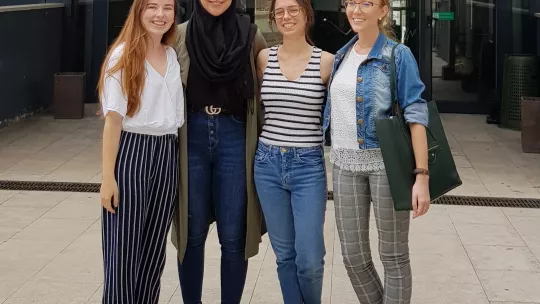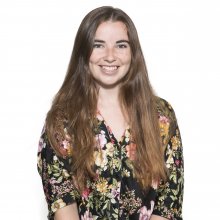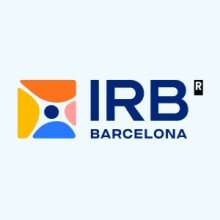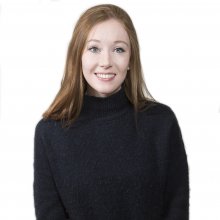Images
One of IRB Barcelona’s missions is to foster scientific vocation. Our A Future in Biomedicinestudents are a clear example.
Today we met up in the PCB cafeteria with Socayna Jouide, Maria Quintana, Aida Bertolotti and Andrea Rodgers, the four young scientists participating in A Future in Biomedicine—our placement programme for final year university students. After spending the year at IRB Barcelona, we wanted to find out how things went.
The four students came from distinct degrees and universities: Socayna and Maria were studying degrees in Human Biology at the Pompeu Fabra University; and Aida and Andrea were doing a Biochemistry degree at the Universitat Autònoma de Barcelona and the University of Barcelona, respectively.
They chose our programme to do their final year dissertation because of the prestige of IRB Barcelona. “I considered it a great opportunity to be able to start my research career surrounded by renowned scientists like Cayetano,”says Socayna, who spent her placement with Cayetano González, head of the Cell Division Laboratory.
Some of the students had spent time at IRB Barcelona previously. Aida had done a summer placement with Miquel Coll, head of the Structural Biology of Protein & Nucleic Acid Complexes and Molecular Machines Laboratory. It was precisely this experience that led her to choose this lab to do her final year dissertation. Andrea, on the other hand, had done a placement with Antonio Zorzano, head of the Complex Metabolic Diseases and Mitochondria Laboratory.
Maria came to IRB Barcelona for the first time when she was 17 years old, thanks to the Crazy About Biomedicine programme. It was this experience that stirred her passion for science. On this occasion, she did her final year dissertation in the Cell Signalling Laboratory co-headed by Francesc Posas and Eulàlia de Nadal. “I had previously spent research placements here but not as long as this one nor with so much responsibility. I was truly involved in a project this time,” she says.
All the students considered that they had benefited from the experience. “I have gained independence,” says Aida. “I have learnt loads, both inside and outside the lab, and I have been surrounded by incredible professionals who have nurtured my development as a scientist,” adds Socayna.
Another attractive aspect of this programme was the possibility to travel to Nijmegen (Netherlands) to find out about the Master’s in Molecular Mechanisms of Disease offered by the University of Radboud. “We met the research groups at the university and the students in this year’s master´s course, who told us about their experience first-hand,” explains Maria.
Indeed, the visit to the University of Radboud led Andrea to enrol n this master´s course. “After seeing how well their programme fitted my interests, I was lucky enough to be among the 20 candidates selected,” she gushes.
The placement at IRB Barcelona has served to strengthen the resolve of these four students to pursue a scientific career. In September, Aida will be starting a Master´s in Biochemistry at the University of Stockholm and Socayna a Master´s in Bioinformatics for Health Sciences at the Pompeu Fabra University. Maria wants to continue to explore other fields, and she will be spending some time in labs in Spain and abroad.
Finally, we asked them what they would be taking away with them from their experience at IRB Barcelona. “The satisfaction of having done some good work and having learnt so much, as well as having fuelled my passion for biomedicine and science,” says Andrea.
For Aida, one of the most important aspects has been “seeing that scientists are normal people and that anyone can become a scientist if they make the effort”. “We have been surrounded by people who are truly dedicated and motivated by science,” adds Maria.
Socayna emphasises the dynamics of the institute. “I was pleasantly surprised by the efforts made to bond the community”. “I like the fact that there is so much connection between all the groups,” says Maria. Aida also appreciated being able to “talk about her work with other groups and find out about other disciplines. The PhD students have been a great help because they are the same age as us and we have been able to share our experience with them”.
We are delighted that the placements at IRB Barcelona have been so enriching for these four students and we wish them all the best in their future endeavours. You never know, we might see them back at the institute one day running their own research groups!
About IRB Barcelona
The Institute for Research in Biomedicine (IRB Barcelona) pursues a society free of disease. To this end, it conducts multidisciplinary research of excellence to cure cancer and other diseases linked to ageing. It establishes technology transfer agreements with the pharmaceutical industry and major hospitals to bring research results closer to society, and organises a range of science outreach activities to engage the public in an open dialogue. IRB Barcelona is an international centre that hosts 400 researchers and more than 30 nationalities. Recognised as a Severo Ochoa Centre of Excellence since 2011, IRB Barcelona is a CERCA centre and member of the Barcelona Institute of Science and Technology (BIST).





